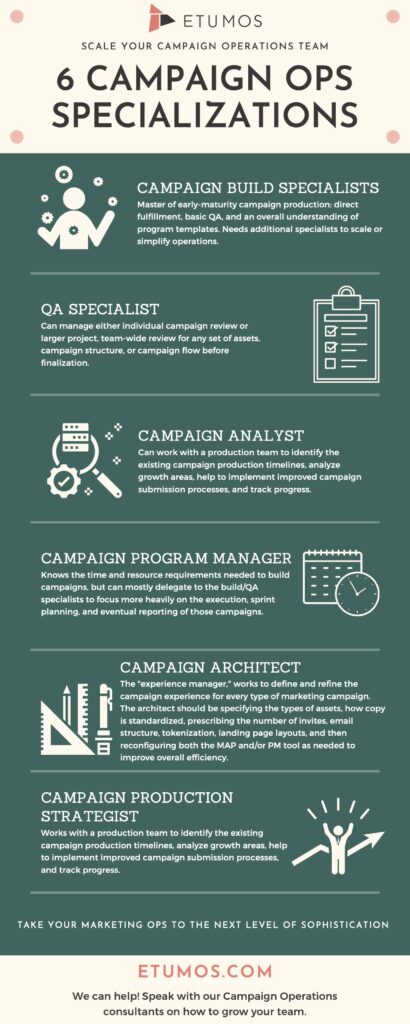Campaign Operations is scaling faster than ever throughout B2B marketing teams and it’s about time. With the right tools and the appropriate staff, end-to-end management of the campaign build process is getting more efficient and more cost-effective than ever before. Now, the question that needs to be addressed is not how many people can do that work, but who specifically should be focusing on which pieces of the campaign production process.
When your company is ready to scale, one of the key questions to consider is how your campaign team is currently structured. And if your team is more-or-less a team of generalists (i.e., “jack or jill of all trades,” general campaign builders), then is it possible to achieve success by simply multiplying the number of generalists, or is it necessary to truly diversify into a team of specialized roles and responsibilities?
The Myth of the Campaign Ops Generalist
One misconception we see frequently is that Campaign Operations is a junior function of the greater umbrella of Marketing Operations. This is an approach and a mindset that’s bound to fail when it comes time for an advanced marketing organization to start strategically scaling campaign production.
Is it possible to just increase a team of junior generalists? Sure. But every company looking to effectively become an advanced marketing organization will require equally-advanced Campaign Operations professionals to guide their scalable processes and architect their campaign flows. Optimizing your campaigns to drive conversions takes a scalable and diversified team, and having specializations within your Campaign Operations team can achieve this.
Domino Effect: Scaling Marketing Operations, Scaling Campaign Operations
You already know you need specialists within the 4 pillars of Marketing Operations as you grow your Marketing Operations team from a single generalist to a powerhouse team of MOPs pros. However, once you have built out specialties across those four pillars, how can you scale your Campaign Operations function so that you cover all of the skill sets needed in this particular pillar?
Much like specializing in one of the 4 pillars, specialization within that pillar allows for staff to focus on the parts of the process where their skill set lies. While it may initially be seen as too granular, we find that teams are most effective when following specialties within the Campaign Operations pillar:
The Six Campaign Ops Specializations
- Campaign Build Specialists
- QA Specialists
- Campaign Analyst
- Campaign Program Manager
- Campaign Architect
- Campaign Production Strategist
Below is a quick summary chart for each of the Campaign Ops Specializations that we see as necessary components of an advanced Marketing Ops team:

When is it time to think about specialized roles in your Campaign Operations team?
The short answer is: Start to emphasize specializations as soon as one of the above functions seems to not be scaling well, and you’re finding errors or gaps in your campaign builds. (This is the 2-minute pitch you make to your CMO when it’s time to scale your Campaign Operations department, with an emphasis on specialization over generalization.)
The long answer is: it depends entirely on the skill set of your existing generalist team and the degree of growth expected in your campaign builds. (This is the 2-hour meeting you should have with your existing team where you determine the growth opportunities, the marketing calendar you expect to develop, and how you want to delegate those roles and opportunities to more effectively own campaign production end-to-end.)
If you are at the early-to-intermediate stages of Campaign Operations maturity (e.g., focused mostly on direct fulfillment, basic QA, and still configuring Program Templates), then the specializations you’ll want to hire/develop will be Campaign Build Specialist and a QA specialist (or someone wearing both hats in a smaller company). Template implementation should rely on a Campaign Architect, or should at least plan to be rebuilt/restructured once an Architect is on board.
As you get into the mid-maturity and advanced stages of campaign production (e.g., operating a Centralized Submission Process, evaluating campaign production performance reporting), then the Campaign Program Manager and the Campaign Production Strategist will quickly become the necessary next steps in terms of specialization and task ownership. No matter the speed at which you expand these specializations, you will need to continually educate your Marketing Managers about the benefits. Scaling campaign production via specialization will ultimately enhance your team’s bandwidth to create more campaigns, ensure that they are well executed, and ensure that your team can measure the ROI of their marketing programs.
It’s going to take more than just one person to raise your department higher along the maturity curve of successful Campaign Operations. It’s also going to take some mental change management, realizing that not all tasks can be done by your 1-person marketing team forever. (And whether that eventual expansion occurs internally or externally might just be a question of budgeting.)
Career Benefits to Specialization
Having a well-defined set of specializations within your Campaign Operations team not only allows your team to succeed in areas that are best matched to their skill sets but also can allow for career growth. You may have someone who comes into your organization with the attention to detail and knowledge of email best practices that work so well for a QA Specialist but suddenly shows an aptitude for reporting. They could move into the efficiency reporting role and gain enough experience and knowledge of operational reports to later move into a marketing intelligence or analyst position. Specializing allows staff to go deep into a topic, while still remaining true to their strengths and ensuring a high caliber of accuracy and efficiency for your marketing programs.
Specializing Does Not Equal Assembly Line Production
One of the goals of a good Campaign Operations team is to continuously create efficiency in the request, build, QA, and reporting processes. It may seem — by breaking out your specialty roles not only by the 4-pillars but also by specializations within those pillars — that you are creating an assembly line production. On the contrary, by allowing your staff to specialize in distinct aspects of the campaign production process, you are creating an environment where each staff member not only does their part but also can get deeply creative and provide a high impact to the business. QA, for example, is an incredibly important role for the variety of campaigns that a Campaign Operations team will be involved in (nurture flow, webinar programs, ad-hoc emails), and someone with a specialization in QA is also able to do the following:
- Align QA checklists to the various program request types in a more logical and directed format
- Manage vendor process for building emails, structuring nurture campaigns, and identifying audience overlap on the marketing calendar
- Request and work with the Campaign Architect (or Platform Operations) to create better program templates with a more logical structure for ease of QA
- Go deep with your compliance or legal team on what needs to be in your email footers (and how to more logically test/troubleshoot for different languages, segments, or dynamic content setup)
- Own the QA process end-to-end
When your team is allowed to “go deep” in an area of focus, it can bring their creative ideas to the subset of the process that they oversee. So while it may initially feel like you are sorting people into smaller job subsets, the reality is that each role can have a huge impact on the workings of the entire process, and only through specialization do you allow your staff to focus on the details that create operational excellence.
Conclusion
If you belong to an advanced org with many MOPs specialists, then there is a high likelihood that these specializations within Campaign Ops won’t come as a surprise — they just might be functions that your org doesn’t currently consider to be “Campaign Operations.” Hopefully, as you’re reviewing the above, you’ll start to see how each specialization is necessary for translating marketing requests into high-performing campaigns, and why the same individuals who execute your campaigns must be able to influence their design and own the campaign production process end-to-end.
Know what you’re looking for but don’t know how to get started? Or perhaps you are ready to dive in but can’t get the headcount? We can help. Contact our Campaign Operations consultants to figure out the best next steps for your department.







